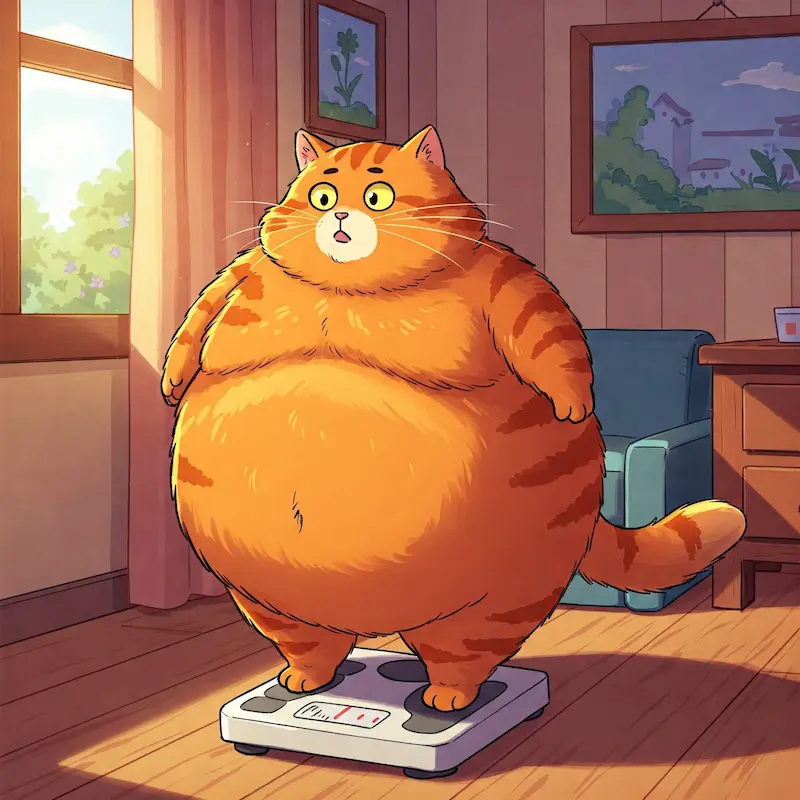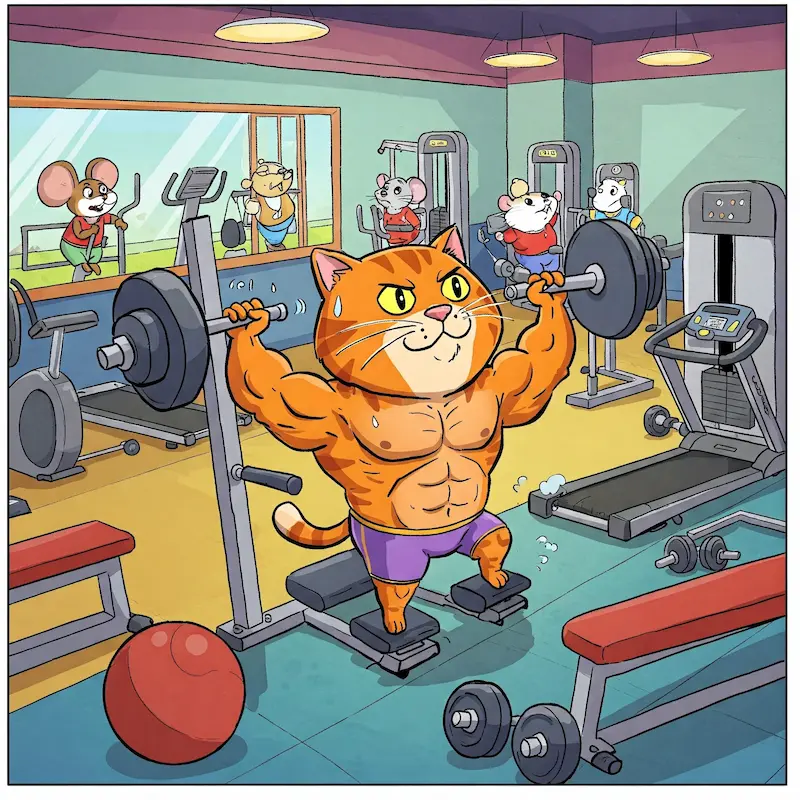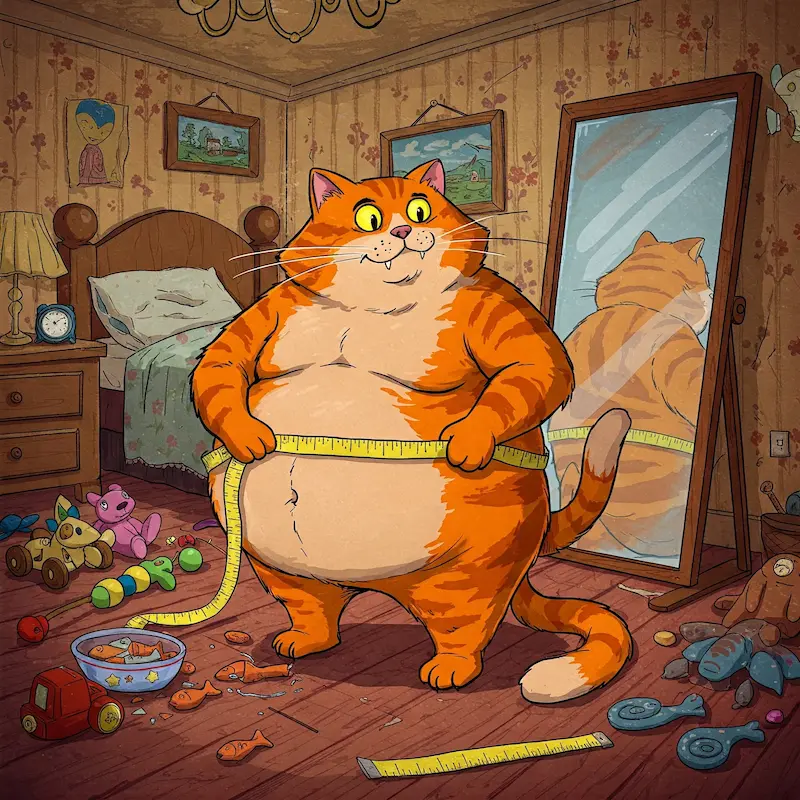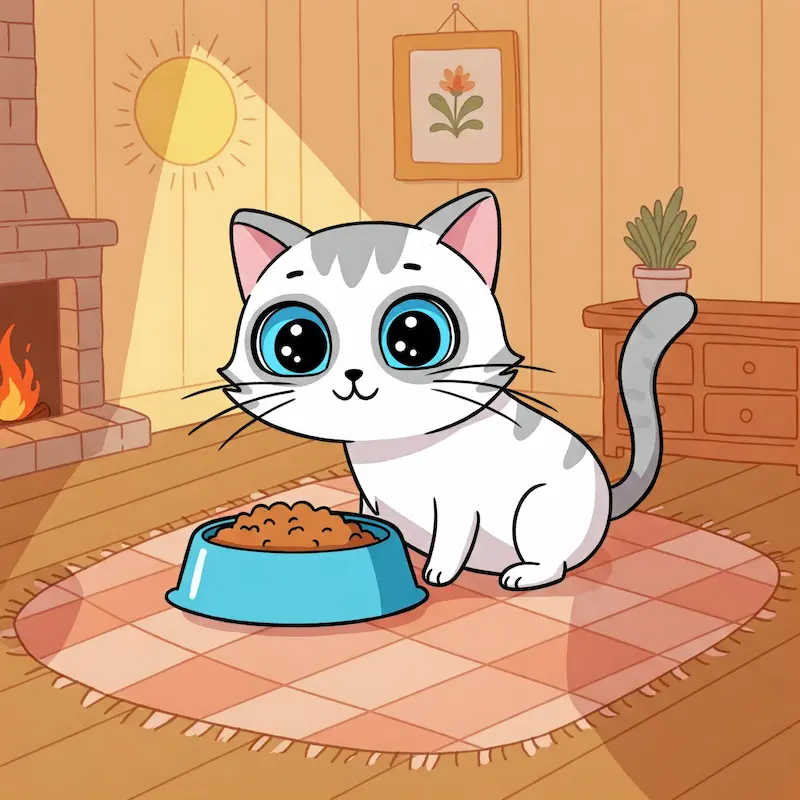Cat Calorie Calculator: How to Determine Your Cat’s Daily Caloric Needs
Every cat deserves the best care, and one of the simplest yet most impactful ways to ensure their well-being is by managing their daily calorie intake. Overfeeding or underfeeding can lead to serious health problems, from obesity to malnutrition.
Cat Calorie Calculator
Estimated Initial Daily Calories
kcal/day
That's where a helpful tool like a cat calorie calculator comes in—it gives you a precise estimate tailored to your cat's unique needs. By keeping track of how many calories your cat consumes, you can support their optimal weight and overall health, paving the way for a longer, happier life.
If you're wondering how to get started, tools like this aren't just for experts. You can also explore additional resources like our food portion guide or browse recipes for healthy treats to keep your feline friend both satisfied and in top shape.
In This Article
Why Your Cat's Caloric Needs Matter
When it comes to keeping your cat healthy and happy, understanding their daily caloric requirements is essential. A well-balanced calorie intake ensures your cat maintains a healthy weight, stays active, and avoids a host of health problems. On the flip side, overfeeding or underfeeding can lead to serious health consequences that affect their quality of life. Let’s discuss why and how getting this right is so important.

The Risks of Overfeeding or Underfeeding Your Cat
Just like with people, the amount of food your cat consumes directly impacts their health. Overfeeding and underfeeding both come with significant risks, but they’re often overlooked until symptoms begin to surface.
What happens if you overfeed your cat?
- Obesity: Overeating is one of the leading causes of feline obesity. Carrying extra weight doesn't just slow your cat down—it increases their risk of developing chronic illnesses like arthritis and heart disease.
- Diabetes: Obesity often leads to diabetes, a condition that requires ongoing medical care and can severely impact your cat's lifestyle and life expectancy.
- Joint Problems: Extra weight puts unnecessary strain on your cat's joints, leading to pain, inflammation, and loss of mobility.
And what if your cat isn’t eating enough?
- Malnutrition: Cats need a precise balance of nutrients; underfeeding leads to malnutrition, leaving them vulnerable to diseases.
- Muscle Loss: You might notice that your cat is becoming weaker over time if they aren’t getting adequate protein and calories.
- Low Energy: Without enough food, cats often become lethargic and less interested in daily activities or play.
To avoid these pitfalls, consider using a cat calorie calculator to get a tailored recommendation for how much to feed your feline friend. This tool helps ensure precision, giving your cat just the right amount of food to stay healthy.
Factors That Affect Caloric Needs in Cats
Determining how many calories your cat needs daily isn’t always straightforward. A variety of factors influence this number, and knowing what they are can help you make better feeding decisions.

Age
Kittens have high caloric needs because they’re growing rapidly. Adult cats, however, require fewer calories—especially if they’re less active. Meanwhile, senior cats might need fewer calories but require a higher protein intake to maintain muscle mass.
Weight
Is your cat underweight, overweight, or just right? You shouldn’t guess when it comes to their weight. An overweight cat needs a reduction in calorie intake to shed pounds safely, while an underweight cat will require extra calories. Tools like a cat weight loss calorie calculator can assist in determining the exact caloric intake needed for gradual and healthy weight changes.
Activity Level
An indoor cat living a cozy and sedentary life will require fewer calories than an outdoor cat that spends their day climbing, running, and exploring. Similarly, playful kittens and energetic young cats need more fuel than older cats who spend most of their time lounging.
Medical Conditions
Cats with certain medical conditions may have unique dietary needs. For example, hyperthyroidism increases metabolism, meaning your cat might need more food, while conditions like kidney disease might require special, lower-protein diets. A veterinarian can provide advice tailored to your cat's health issues.
Lifestyle also plays a huge role. A strictly indoor cat may need fewer calories compared to one with outdoor access, where they’re more active. If you’re curious about foods to meet your specific feline’s needs, explore this list of healthy treat recipes for options your cat will love.
Knowing your cat's caloric requirements isn't just good for their health—it keeps them happier in the long run. Plus, it’s a simple yet significant way to show just how much you care.
How to Use a Cat Calorie Calculator Effectively
A cat calorie calculator is a straightforward tool that can transform how you manage your cat's nutrition. By considering your cat’s unique characteristics—such as their weight, activity level, and age—it provides an accurate estimate of daily caloric needs. To get the most out of this tool, it’s important to understand how it works and how to apply the results in a practical way. Let’s break it down step by step.

Understanding the Calculation Process
To feel confident using a cat calorie calculator, it helps to know what’s happening behind the scenes. These calculators rely on specific formulas to determine caloric needs, the most common being the Resting Energy Requirement (RER). This formula calculates the baseline energy a cat needs to maintain basic bodily functions like breathing, circulation, and digestion at rest.
Here’s a simplified version of the RER formula:
RER = 70 × (Body Weight in kg)0.75
Once the RER is determined, it’s adjusted using an activity multiplier to account for factors like energy levels, reproductive status, or weight goals. For example:
- Sedentary adult cats: Multiply RER by 1.0.
- Moderately active cats: Multiply RER by 1.2–1.4.
- Highly active or outdoor cats: Multiply RER by 1.6–2.0.
- Pregnant or nursing cats: Multiply RER by up to 4.0, depending on the stage.
When you use a cat calorie calculator, you’ll typically be asked to input your cat’s weight (in pounds or kilograms), their activity level, and sometimes their age or specific life stage. The calculator then applies these adjustments to customize the results for your cat’s unique energy demands.
This personalized approach ensures your indoor nap enthusiast or adventure-seeking outdoor explorer gets precisely what they need to thrive.
Interpreting the Results
After running the numbers, you’ll receive a tailored calorie recommendation. This figure represents the approximate amount of calories your cat should consume daily. But how do you turn that number into actionable results?
- Assess your cat’s current diet: Check the nutrition labels on their cat food packaging to find how many calories are in a serving. Most brands list the caloric content per cup, can, or ounce. Use this information to measure portions that align with the recommended daily calories.
- Divide into appropriate meals: If your cat eats multiple times a day, split the total calorie count across their feeding schedule. For example, if the calculator recommends 200 calories per day and your cat eats twice daily, each meal should provide about 100 calories.
- Monitor their response: While calorie calculators provide a solid starting point, every cat is different. Factors like metabolism, underlying health conditions, or behavioral quirks can impact how effectively their body processes food. Keep an eye on their weight, coat condition, and overall energy levels to ensure the diet meets their needs.
- Adjust as needed: If your cat is gaining or losing weight unintentionally, you might need to revisit their calorie intake. A general rule of thumb is to adjust by 5–10% and track changes over a few weeks.
- Consult your veterinarian: If you’re unsure about the results or your cat has specific health considerations, check with your vet. They can provide additional insight and ensure the feeding plan supports any medical needs.
Balancing calories isn’t just about numbers. It’s about observing your cat’s unique requirements and responding as their needs evolve. Just like us, factors like aging, stress, or even the change of seasons can affect their energy needs, so staying flexible is key. A cat calorie calculator helps lay the groundwork, but your observations and care complete the puzzle.
Maintaining Healthy Weight and Adjusting Caloric Intake
Cats, like humans, thrive when they maintain a healthy weight. Whether your cat is starting to look a little round in the middle or feels bony beneath their fur, adjusting their caloric intake is key to addressing weight concerns. Finding the right balance is easier when you use tools like a cat calorie calculator to precisely measure their needs. In this section, we’ll explore how to identify when adjustments are necessary, actionable tips for weight management, and the importance of staying consistent during the process.
Signs Your Cat May Need Adjustments
Feeding cats isn’t always as straightforward as it seems. Overfeeding or underfeeding can lead to noticeable health changes, and addressing these early prevents long-term complications. So, how can you tell if something is off?
Here are signs your cat may need a calorie adjustment:
- Weight gain: If your cat is carrying extra pounds, you might notice difficulty jumping, reduced energy, or a rounder belly. Use tools like a cat calories per day calculator to revisit how much they’re eating versus how much they should eat.
- Weight loss: On the flip side, unexpected weight loss—especially with visible ribs or spine—can signal underfeeding or an underlying medical issue. A simple calculation of their daily caloric needs can ensure they’re getting enough food.
- Changes in appetite: If they’re leaving food uneaten, they might be overfed. Conversely, constant begging or seeking food could indicate their meals aren’t meeting their needs.
- Coat condition and energy levels: A dull coat, sluggish behavior, or disinterest in playtime may also be tied to an imbalanced diet. Caloric intake directly impacts energy and nutrient reserves.
When you spot these clues, don’t panic. Start by reassessing how you measure their food and use a tool like a cat calorie calculator to confirm if portion sizes align with their needs. Just a small adjustment, based on accurate data, can make all the difference.
Weight Loss and Management Tips

If your cat is overweight, shedding those extra pounds is about smart portion control and patience. Crash dieting isn’t safe for cats, as it can lead to serious health issues like liver disease. Instead, gradual, sustained change is the goal. Here are practical tips to help them lose weight and maintain it:
- Calculate their ideal caloric intake: Start by using a trusted cat weight loss calorie calculator to determine how many calories they actually need daily. This tool factors in their target weight rather than their current weight, creating a safe path to weight loss.
- Switch to portion-controlled feeding: Free-feeding (leaving food out all day) often results in overeating. Measure their meals precisely with a scale or measuring cup to ensure they aren’t consuming extra.
- Choose weight-management formulas: Many pet food brands offer low-calorie options specifically designed for less active or overweight cats. These provide essential nutrients without excess calories.
- Incorporate interactive play: Encourage activity with toys like feather wands, laser pointers, or puzzle feeders. Regular play not only helps burn calories but also keeps your cat mentally stimulated. Aim for at least 15-20 minutes of interactive play daily.
- Meal timing and splitting portions: Divide their daily allowance into smaller, more frequent meals to mimic their natural grazing behavior. For example, if their total daily calories are 180, try feeding 60 calories three times a day.
- Monitor treats: Treats add up quickly and can derail calorie goals. Stick to low-calorie options or swap treats for affection and play sessions.
- Stay patient: Healthy weight loss for cats is slow, aiming for about 1-2% of their body weight per week. Dramatic or rapid changes can harm them, so consistency and small progress matter most.
These steps not only help overweight cats slim down but set the stage for long-term weight maintenance. Always consult with your veterinarian when making significant feeding adjustments or if your cat has specific medical concerns.
Consistency and Monitoring Progress

When it comes to maintaining or adjusting your cat’s weight, consistency is non-negotiable. Cats thrive on routine, and sticking to regular feeding and monitoring schedules ensures you can track their progress accurately.
Here’s how to stay consistent and monitor effectively:
- Stick to a feeding schedule: Feed your cat at the same times every day. This routine helps regulate their appetite and prevents over-snacking.
- Weigh your cat regularly: Invest in a pet scale or use your own bathroom scale (by first weighing yourself, then holding your cat and subtracting the difference). Record their weight every 2-4 weeks to track changes over time.
- Adjust gradually: If you’re not seeing results, resist making drastic changes. Instead, adjust caloric intake by 5–10% and monitor how your cat responds over a few weeks.
- Track food intake: Use a notebook, app, or chart to record exactly how much they eat daily. This includes main meals, treats, and any extras they might sneak in. Patterns in food consumption can reveal areas for improvement.
- Monitor body condition: Beyond just weight, pay attention to their overall shape and body condition. Can you feel their ribs without pressing hard? Do they have a visible waist? Checking these cues offers a holistic view of their health.
Regular monitoring not only ensures their diet is on the right track but also strengthens the bond you share with your pet. By keeping a close watch and being consistent, you’ll provide them with the nutrition they need to thrive. For the best results, check in with a veterinarian periodically and use tools like a cat calorie calculator to keep everything aligned.
Common Mistakes to Avoid When Calculating Cat Calories
Accurately determining how many calories your cat needs daily is crucial for their overall health. While tools like a cat calorie calculator and food packaging guidelines can be helpful, relying on them alone can often lead to mistakes. These errors may seem minor, but over time, they can contribute to weight issues, nutritional deficiencies, or other health problems.

Misleading Food Label Guidelines
Food packaging may seem like the easiest place to start when figuring out how much to feed your cat. However, these recommendations can be too generic.
Food labels often provide guidelines based on broad weight ranges or idealized activity levels rather than factoring in the nuances of your specific cat. For example:
- A label might suggest feeding “X amount for a 10-pound cat,” without considering whether that cat is highly active or sedentary.
- Feeding the same portions to different cats can lead to underfeeding or obesity.
Why does this happen? Pet food manufacturers are required to offer general guidance, but they don’t have insight into your cat’s unique needs.
Solution: Use the label as a reference point, but refine the portion using a reliable cat calorie calculator that factors in weight, activity level, and life stage.
Ignoring Activity and Health Factors
When calculating calorie needs, it’s easy to overlook how much your cat’s lifestyle impacts their energy requirements. Just like humans, cats have varying activity levels.
Key Factors to Consider:
- Indoor vs. Outdoor Cats: Indoor cats are typically less active, while outdoor explorers might burn more calories.
- Age and Life Stage: Kittens require more calories than senior cats.
- Spayed or Neutered Cats: These cats often have slower metabolisms.
- Health Conditions: Hyperthyroid cats may need more calories, while obese or diabetic cats require careful calorie control.
Solution: A cat calorie calculator customized with these details ensures a much more accurate feeding plan.
Not Reevaluating Over Time
Your cat’s nutritional needs change over time. Many pet parents fail to adjust feeding portions, leading to potential weight gain or deficiencies.
When to Reevaluate:
- Transitioning from kittenhood to adulthood or from adulthood to senior years.
- Activity level changes, such as a previously active cat becoming more sedentary.
- Medical conditions requiring dietary adjustments.
Solution: Regularly monitor your cat’s weight and adjust calorie intake accordingly. Use a cat calorie calculator every few months.
Conclusion
Giving your cat the right number of calories each day is one of the simplest yet most impactful ways to protect their health. Tools like a cat calorie calculator can take the guesswork out of feeding, helping you feel confident about your choices.
Every cat is unique. Regularly monitoring their weight, adjusting their calorie intake, and consulting your veterinarian ensures they stay on a healthy path.
Start using a reliable cat calorie calculator today and take control of your feline’s nutrition. Small changes to their diet can lead to big improvements in their well-being.
Cat Calorie Calculator FAQ
- How do I calculate how many calories my cat needs?
- The calorie count depends on your cat’s weight, age, activity level, and overall health. A general guideline is 20-30 calories per pound of body weight per day. For a more precise number, use a cat calorie calculator or consult your vet.
- Does my cat need more calories if it's very active?
- Yes, active cats burn more energy and may need additional calories. Cats that play or roam outside often need more food compared to indoor cats who are less active. Adjust their intake based on their weight and activity level.
- Should I account for my cat's age when calculating?
- Absolutely. Kittens, adults, and senior cats have different nutritional needs. Kittens require more calories for growth, while senior cats may need fewer calories to maintain a healthy weight.
- What if my cat is overweight?
- For overweight cats, it’s important to create a calorie deficit to help them lose weight safely. Work with your vet to determine an ideal daily calorie intake and portion sizes. Don’t reduce calories too drastically, as cats can develop health issues like hepatic lipidosis (fatty liver disease) if they lose weight too fast.
- How do I know if my cat is eating too many calories?
- Signs of overfeeding include weight gain, decreased activity, and difficulty grooming. Use regular weigh-ins and observe your cat’s body shape. You should be able to feel their ribs without pressing too hard but not see them.
- Can I use a calorie calculator for kittens?
- Yes, but make sure the calculator you’re using accounts for kittens. Kittens need more calories per pound compared to adults to support growth and development, typically 50-60 calories per pound per day.
- Does spaying or neutering affect my cat’s calorie needs?
- It can. Cats often become less active after being spayed or neutered, which lowers their calorie needs by about 20-25%. Monitor their weight closely and adjust portions to prevent overeating.
- What about special conditions like pregnancy or illness?
- Pregnant or nursing cats need extra calories—sometimes up to double their normal intake. For sick cats or those with conditions like diabetes or kidney disease, dietary needs vary. Always follow your vet’s guidance in these cases.
- How accurate are cat calorie calculators?
- Calorie calculators provide a helpful estimate, but individual needs vary. Factors like metabolism, activity level, and underlying health conditions can influence how many calories your cat actually needs. Use the calculator as a starting point, and adjust as needed.
- How can I track my cat’s weight and calorie intake?
- Weigh your cat regularly—once every two weeks is a good starting point. If they’re gaining or losing weight too quickly, reassess their calorie intake and portion sizes. Keep a simple journal to track daily food amounts and weight changes.
- Is portion size the same as calorie count?
- No, they’re different. Portion size refers to the amount of food, while calorie count measures the energy in the food. Always check the nutrition label on your cat’s food to calculate how many calories are in their daily portion.
- Should treats count toward my cat’s calorie intake?
- Definitely. Treats should make up no more than 10% of your cat’s daily calorie allowance. Overfeeding treats can lead to weight gain and unbalance their diet.
- What if my cat refuses to eat less food?
- Cats can be resistant to dietary changes. Transition gradually by slightly decreasing portions over a few weeks. You can also try feeding smaller, more frequent meals throughout the day to help them feel satisfied.
- How do I know if my cat is at a healthy weight?
- Check for a visible waistline when looking at your cat from above and feel for their ribs with a light touch. Your vet can also help assess your cat’s body condition score during a check-up.
- Do I need to consult a vet to calculate my cat's calorie needs?
- While you can use online tools for an estimate, it’s always a good idea to discuss your cat’s diet with a vet. They’ll consider your cat’s specific health needs and recommend a personalized feeding plan.
- Can wet food and dry food impact calorie needs?
- Yes, wet food and dry food have different calorie densities. Wet food usually contains fewer calories per gram because of its higher water content. Be sure to check the calorie information on the packaging for accuracy.
- How does weight loss or weight gain work in cats?
- For healthy weight loss, aim for about 1-2% of their body weight per week to prevent complications. For weight gain, increase calories gradually, offering nutrient-dense foods. Always consult your vet to avoid health risks.
CatsLib.com relies on trusted, high-quality sources, including peer-reviewed research, to back the information in its articles. We regularly review and update our content to ensure it remains accurate and reliable.
- Case, L. P., Carey, D. P., Hirakawa, D. A., & Daristotle, L. (2011). The Cat: Its Behavior, Nutrition & Health
- Hand, M. S., Thatcher, C. D., Remillard, R. L., Roudebush, P., & Novotny, B. J. (2010). Small Animal Clinical Nutrition (5th ed.).
- Debra Eldredge. Cat Owner's Home Veterinary Handbook
- National Research Council (2006). Nutrient Requirements of Dogs and Cats. National Academies Press.
- Cat Food – Wikipedia
- PetMD: How Many Calories Does a Cat Need?
- VCA Hospitals: Feeding Your Cat
- ASPCA: Cat Nutrition Tips
Recent Articles

Why Are Siamese Cats Cross Eyed? Genetics, Health, and Care Guide

Do Ragdoll Cats Shed a Lot? Seasonal Tips to Manage Fur and Keep Your Home Clean

10 Medical Reasons Your Cat Is Walking in Circles – Signs You Should Never Ignore

Why Does Your Cat Scratch Around Its Food Bowl? Top Reasons and Simple Solutions
